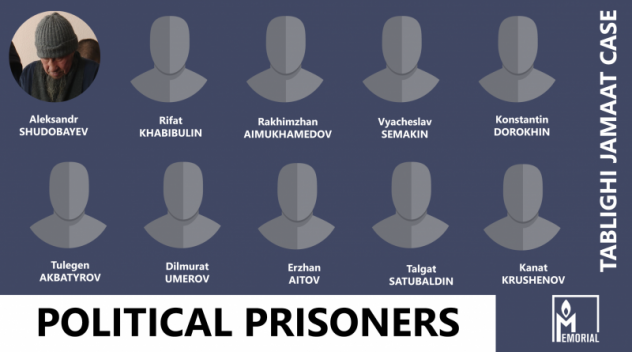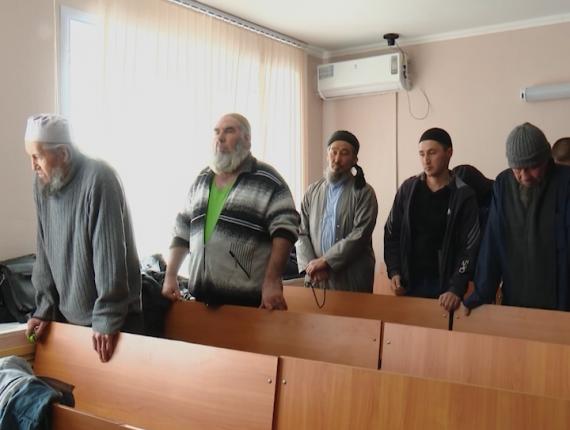Ten Muslims from Orenburg, convicted in the case of the banned Tablighi Jamaat, are political prisoners
The 10 Muslims were sentenced to terms ranging from two years to six and a half years in a general regime penal colony on charges of extremism solely on account of their involvement in Tablighi Jamaat
Memorial Human Rights Centre, in accordance with international guidelines, considers Aleksandr Shudobayev, Rifat Khabibullin, Rakhimzhan Aimukhamedov, Tulegen Akbatyrov, Dilmurat Umerov, Erzhan Aitov, Talgat Satubaldin, Kanat Krushenov, Vyacheslav Semakin and Konstantin Dorokhin to be political prisoners. We believe that they have been prosecuted on political grounds in connection with the non-violent exercise of the rights to freedom of conscience, religion, expression and association, in order to maintain and further strengthen the power of the authorities. We consider, on the basis of available information, that the defendants in the case have been deprived of liberty in the absence of any evidence of a crime and in violation of the right to a fair trial. We believe that their conviction should be quashed and they should be released from custody.
Who was convicted and for what?
On 11 March 2019, the Central district court in Orenburg handed down guilty verdicts in the case of ten local Muslims for their involvement in the Islamic movement Tablighi Jamaat, which is banned in Russia.
Aleksandr Shudobayev, 65, was sentenced to six and a half years in a general regime penal colony for organising the activities of an extremist organisation (Article 282.2, Part 1, of the Russian Criminal Code). The other Muslims were convicted on charges of participating in the activities of an extremist organisation (Article 282.2, Part 2, of the Russian Criminal Code). Rifat Khabibullin, 52, was sentenced to two and a half years in a penal colony, while Rakhimzhan Aimukhamedov, 55, Tulegen Akbatyrov, 32, Dilmurat Umerov, 58, Erzhan Aitov, 45, Talgat Satubaldin, 32, Kanat Krushenov, 45, Vyacheslav Semakin, 45, and Konstantin Dorokhin, 43, were each given two years in a penal colony.
In May 2019 Orenburg regional court upheld the sentence on appeal.
According to the verdict, in the years 2015-17 Aleksandr Shudobayev organised meetings of an Orenburg cell of Tablighi Jamaat in which the other defendants took part. At these meetings they read and discussed religious literature. In addition, from time to time the defendants made special trips during which they urged Muslims to comply with the requirements of Islam.
Why Memorial considers this case politically motivated
Memorial Human Rights Centre has studied the verdict in the case of the ten Orenburg Muslims and concluded that their prosecution and punishment has no basis in law and was politically motivated.
We know that none of those convicted were charged with inciting violence or with carrying out acts of violence. All charges in the case relate solely to involvement in the Islamic movement Tablighi Jamaat, which is banned in Russia.
Some of the defendants in the case pleaded not guilty and refused to testify. Others confirmed that they had indeed met to read and discuss religious literature but stressed that there was nothing illegal in their actions.
All the prosecution evidence - witness statements, phone records of the convicts and analysis by experts - is aimed solely at proving the involvement of the defendants in Tablighi Jamaat.
 Memorial considers the designation in May 2009 of the Tablighi Jamaat movement as extremist to be unfounded and unlawful. The decision of the Russian Supreme Court, dated 7 May 2009, contains no evidence of any activities by the movement that are of an extremist or violent nature. We believe that Tablighi Jamaat is engaged in peaceful propaganda of Islam and has not been involved in any way in incitement of violence.
Memorial considers the designation in May 2009 of the Tablighi Jamaat movement as extremist to be unfounded and unlawful. The decision of the Russian Supreme Court, dated 7 May 2009, contains no evidence of any activities by the movement that are of an extremist or violent nature. We believe that Tablighi Jamaat is engaged in peaceful propaganda of Islam and has not been involved in any way in incitement of violence.
Consequently, in our view, prosecution for an extremist offence solely on the basis of involvement in Tablighi Jamaat is also unlawful.
Nevertheless, charges of involvement in the organisation automatically result in prison sentences. Memorial is already aware of several such cases.
More information about this case and the position of Memorial Human Rights Centre is available on our website.
Recognition of an individual as a political prisoner or as a victim of politically motivated prosecution does not imply Memorial Human Rights Centre agrees with, or approves of, their views, statements, or actions.
- You can support all political prisoners by donating to the Fund to Support Political Prisoners of the Union of Solidarity with Political Prisoners via PayPal, using the e-wallet at [email protected].



